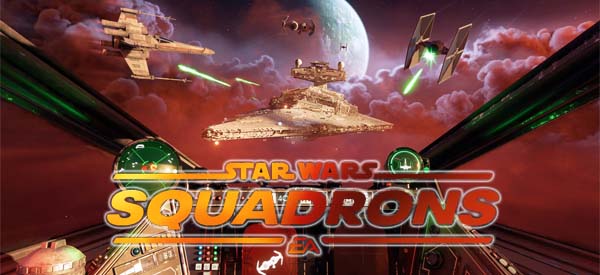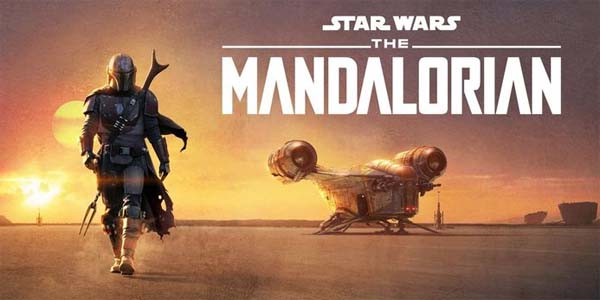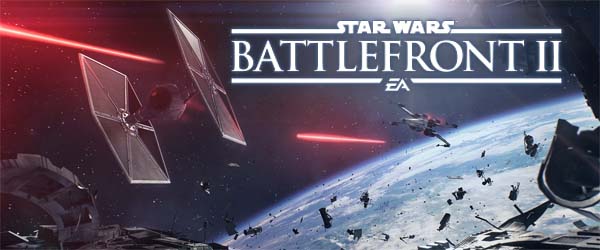
I don't think it will be controversial to say that the best part of EA's 2017 Star Wars Battlefront II was the multiplayer space dogfighting. It made me yearn for a good Star Wars flight sim in the vein of the old X-Wing and TIE Fighter PC classics. But in this age of big-budget, micro-transaction-fueled, multiplayer-focused, spectacle shooters, I wasn't going to hold my breath for EA (the exclusive rights-holder to Star Wars games) to deliver any time soon, especially after a planned remake from LucasArts was canceled back in 2009.
So it came as a surprise to see Star Wars: Squadrons. Yes, it's an online game with a competitive multiplayer focus, so no divergence from modern norms there. But it's also a $40, "middle-shelf" game built on a lower budget than the usual AAA blockbuster that EA produces. That lower budget and pricetag seems to have liberated developer Motive from much of the corporate burden of expectations associated with a larger-scale, more expensive product. Squadrons takes a few risks by raising the expectations and barrier of entry for players, and it doesn't stoop to offsetting its lower pricetag by incorporating a micro-transaction economy (at least not yet).
A flight-sim light
Much like the Ace Combat series, Star Wars: Squadrons hits a good, comfortable middle-ground between an arcade dogfighter and a flight-sim. Squadrons even errs a bit closer to sim in some regards via its power-allocation and sub-system-management mechanics. It is also much more restrictive about the use of special weapons. While Ace Combat allows players to coast along by shooting down almost every enemy plane with your stockpile of 60 or 70 missiles (despite flying a plane that only has between 2 and 6 missles strapped to its undercarriage), Squadrons focuses much more heavily on the use of the fighters' primary laser cannons.
Squadrons locks the player into a cockpit view.
Players are even locked into a cockpit view with limited HUD elements, forcing players to rely on the cockpit instruments. This game makes me wish I had a good PS4-compatible flight stick. The only flight stick I own is an old PC one, which I had to jury-rig to work with Ace Combat 7 on Steam.
No, it isn't as as involved as the classic X-Wing and TIE Fighter PC flight sims, but it's a significant step up from the N64 Rogue Squadron game and its sequel.
Motive has redeemed itself from the awful
single-player campaign of Battlefront II.
A more serious effort
Squadrons shows a lot of signs of learning from the failures of Battlefront II. In fact, I was surprised to find out that Motive was not the studio that developed Battlefront II's space dogfighting. That duty was handled by Criterion Studios. Motive was, in fact, the studio behind Battlefront II awful single-player campaign.
This time, Motive seems to have put some actual thought and effort behind Squadrons' campaign, its story, and its characters. Almost as if this is a project that the studio actually wanted to do, rather than being a project that was imposed upon them by a greedy publisher who just wants a token single-player mode in a game that is actually designed to scam money out of people with pay-to-win online multiplayer. [More]
6b0898a3-e76b-46e8-b3fa-ca9e10854698|1|5.0
Tags:Star Wars, Star Wars: Squadrons, EA, Electronic Arts, dogfighting, cockpit, VR, flight sim, multiplayer, Galactic Empire, New Republic, X-Wing, Y-Wing, A-Wing, U-Wing, TIE Fighter, TIE Bomber, TIE Interceptor, TIE Reaper, Star Destroyer, MC-75, Mon Calamari cruiser, corvette

One of my biggest complaints with Disney's Star Wars movies has been their complete lack of original ideas, and their complete unwillingness to move the Star Wars narrative forward. That's actually why I didn't think The Last Jedi was as bad as most people said it was. I mean, it wasn't "good" by any stretch of the imagination. The script was messy, the tone was uneven, and a lot of the movie's logic was fundamentally flawed. But I appreciated much of the bold thematic elements. The Last Jedi wanted desperately to move the franchise in new directions, and it actively mocked the previous film(s) (and the fanbase) for being too trapped in the past.
The rest of Disney's Star Wars movies haven't been so bold. The Force Awakens was a rehash of the original movie. Rogue One and Solo were both prequels that nobody asked for that both attempted to explain minutia that never needed explaining to begin with. I haven't seen Rise of Skywalker yet, but I'm hearing that it's an exceedingly dumb rehash of Return of the Jedi, and possibly the worst Star Wars movie since The Pantom Menace. And that's the "gentle" criticism that I'm hearing from people who were generally favorable towards Disney's treatment of Star Wars!
Suffice it to say, outside of the X-Wing and Armada tabletop games (which I love and still regularly play), I have become so jaded and sick of Star Wars that I didn't bat an eye at Disney's announcement of The Mandalorian. I just assumed that it was a prequel series about young Boba Fett that would continue the Star Wars trend of fixating on its past. I had no interest in watching the series, and I sure as hell was not going to pay a monthly subscription to Disney to watch it.
But I guess a free subscription to Disney Plus came with our Verizon phone plan, and my girlfriend was hearing some good word-of-mouth in the week after the first episode premiered, so we've been having stay-in date nights to watch it. I want to say, by the way, that I like this approach of releasing episodes of a streaming series on a fixed schedule, rather than dumping a whole season all at once. It facilitates water-cooler talk because everybody else is at the same point in the narrative that you are. You have time to digest the events of each episode and talk about them, and you are able to speculate with friends over what's going to happen next, because your friends don't know either! You'd think that streaming services like Netflix and Hulu would have figured this out with the success of HBO's Game of Thrones weekly release schedule, but they didn't. Disney learned. (and so did CBS).
The Mandalorian feels like it's actually pushing the Star Wars narrative forward.
... [More]
9af949f8-bcdc-48c6-8e4d-0265034ac0cf|1|5.0
Tags:The Mandalorian, Disney, Disney Plus, streaming television, Lucasfilm, Star Wars, Mandalorian, bounty hunter, Yoda, baby Yoda, child, the Force, Galactic Empire, New Republic, Christmas, toy

Dang, I was really hoping to get this one out before the end of the year...
Thanks to previews, journalists, and complaints from beta users, this is yet another game that I knew better than to buy on launch day at full retail price. Even before the game came out, beta players and gaming websites were already condemning Battlefront II for its pay-to-win multiplayer system. When the media finally got their hands on preview builds of the full game, they were quick to attack the online progression system. Once the game was released, public outcry forced EA to literally neuter the game's online economy.
Slot machines are legally required to disclose
their paytables -- and sometimes their RTP.
EA started damage control by slashing the prices of heroes so that they supposedly weren't as much of a grind to unlock. However, the sneaky bastards also reduced the rewards for various in-game activities (such as completing the campaign), so as to render the cost reduction virtually moot. Then, EA disabled micro-transactions altogether. So by the time I finally started playing the game (over a month after launch), it was a totally different experience than it was intended to be at launch.
Star Wars license-holder Disney was furious with EA for potentially tarnishing the Star Wars brand (especially with the pending release of The Last Jedi). EA's stock prices fell as a result.
Battlefront II has actually caused law-makers and regulatory agencies in the United States and Europe to consider whether loot boxes qualify as "gambling", and whether they should, therefore, be regulated as such, including banning their sale to minors. Corporations are also starting to hop onto the bandwagon of self-regulation. Apple announced that all iOS apps with randomized micro-transactions must disclose the odds associated with rewards. This is the same disclosure that is actually legally required for actual gambling, such as slot machines.
For the record, I do not object to gambling per se. I actually bet every week on college and NFL football. Don't worry, I live in Nevada; it's legal for me. I spent almost three years working as a game developer for a slot machine manufacturer, and the only reason that I'm not still at that job is because the entire department in which I worked got laid off in the wake of a corporate merger (I'm actually very bitter and opposed to corporate mergers, by the way, but that's a discussion for another time). So I don't have a problem with gambling. I just think that it has a time and a place, and I don't want that time or place to be in my video games that I'm already paying $60 just to play. This is why casinos don't generally charge a cover fee.
I personally feel that Shadow of War and Destiny 2 are much more egregious examples of corporate avarice.
Also, for the record, I think that Battlefront II's micro-transaction controversy is a bit overblown. It's an online multiplayer shooter in which there is no win condition or end state. Whether you want the extra hero characters, and whether you're willing to spend time or money to get them is entirely up to the player's own whim. The game is perfectly playable without those heroes, and you can play through the campaign completely without spending an extra penny. It's a bit sleazy that EA markets the game by advertising these characters, and then locks them behind a grind/pay wall, but fighting games have been hiding unlockable characters behind grind-walls for decades.
Battlefront II isn't even the worst micro-transaction / pay-to-win system to come from EA! EA Sports titles like Madden and FIFA have been getting away with much worse pay-to-win systems (via their respective Ultimate Team modes) for years. Personally, I also think that Shadow of War (review coming very soon) has a much more offensive micro-transaction model because Warner Bros actually tied it into that game's campaign. If you want to finish the story, you either have to sit through the grind, or pay to speed it up. Though all of these pale in comparison to Activision and Bungie locking formerly-accessible end-game content behind the pay-wall of a Destiny 2 expansion pack.
In any case, it's sad that a review of a video game has to turn into a political op-ed, but that's the sad state of things right now.
Controversy and public outrage forced EA to completely disable in-game purchases.
So, if I knew that the game was controversially terrible, why did I bother to play it? ... [More]
ca397aec-963c-441f-946e-73a4ac8e54dd|1|4.0
Tags:Star Wars, Star Wars: Battlefront, Star Wars: Battlefront II, loot box, micro-transaction, multiplayer, shooter, single player, campaign, Galactic Empire, Imperial Raider, Star Wars: X-Wing, Disney, EA, Electronic Arts, DICE, Motive Studios, Criterion Games, gambling, regulation, casino, eBay
|

| 12 | | | | | | | 60 | | 11 | | | | | | | 55 | | 10 | | | | | | | 50 | | 09 | | | | | | | 45 | | 08 | | | | | | | 40 | | 07 | | | | | | | 35 | | 06 | | | | | | | 30 | | 05 | | | | | | | 25 | | 04 | | | | | | | 20 | | 03 | | | | | | | 15 | | 02 | | | | | | | 10 | | 01 | | | | | | | 05 |
|